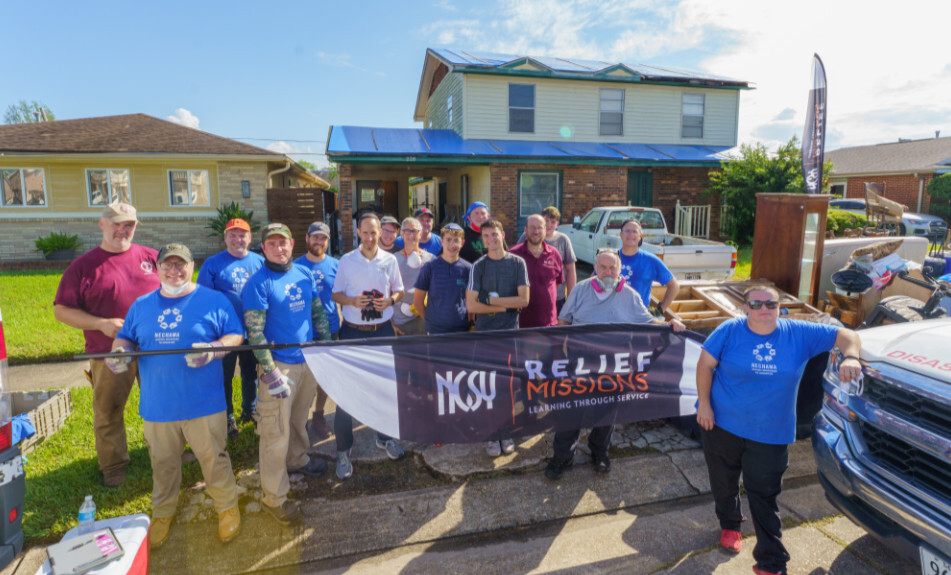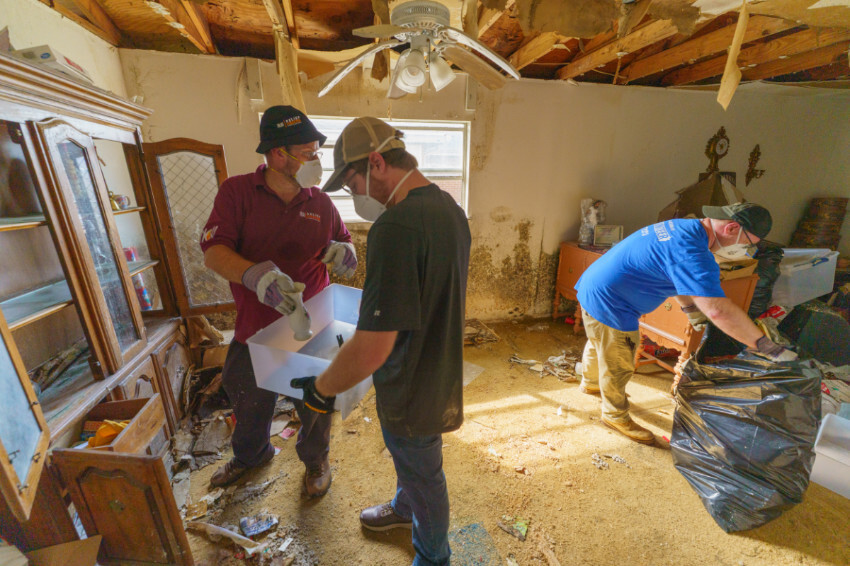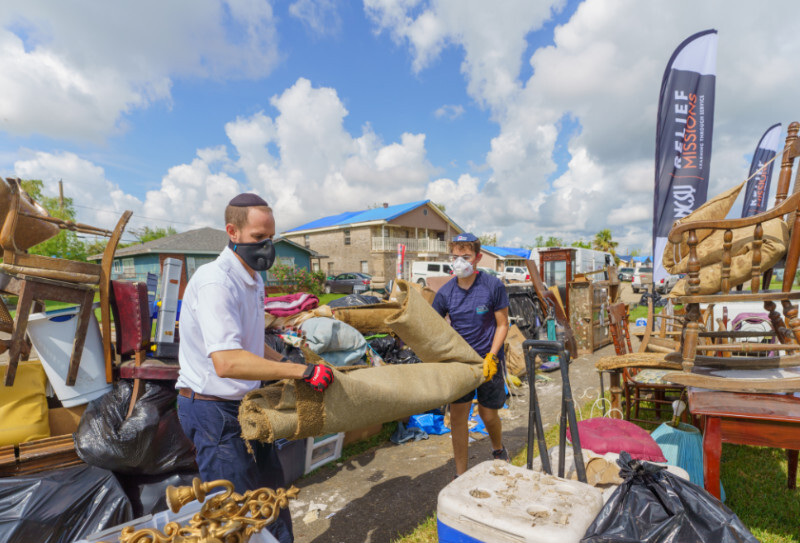
The Jewish People have many needs. Locally, we have numerous schools and organizations that need funding, elderly people who rely on our help for a safety net and, unfortunately, no shortage of people who struggle to afford an Orthodox lifestyle.
There are so many Jews around the world who could use more assistance and aid; considering this, you might be wondering why the Jewish community and the State of Israel are consistently at the forefront of relief efforts around the world, not only ones affecting Jewish communities.
Almost immediately following many disasters, whether it be an earthquake in Haiti, a building collapse in Surfside or a hurricane in the Caribbean, pictures of Israeli rescue efforts appear online. We celebrate these efforts, and are filled with pride that our little country, ridiculed by so much of the word, shows up and makes a difference when tragedy strikes. Our holy soldiers and medical workers are often times the first ones on the ground providing aid and relief.

But, with so many needs within the Jewish community, both locally and internationally, should we be doing it? This question presented itself as fifteen members of Boca Raton Synagogue embarked this week to New Orleans for a relief mission in the aftermath of Hurricane Ida. Over a two-day period, in partnership with the Orthodox Union, NCSY Relief Missions, and Nechama, we logged more than 210 hours volunteering in St. Charles Parish, where we assisted three families.
We gutted their homes, removed moldy drywall, and started them on the path to rebuilding. It was tiring, hard work and, at times, even a little fun. It was a great bonding experience and helped form a very special camaraderie. But, why do it at all? Why spend two days helping people we had never met and likely will never meet again, especially considering the many needs within the Jewish community?
In May 1960, Chile was struck by the most powerful earthquake ever recorded. The catastrophe left millions of people homeless and caused unimaginable damage, injury, and death. Following this disaster, Rav Yechezkel Levenstein, the mashigaich ruchani of the Mir Yeshiva, demanded that the Yeshiva students empathize more strongly with those who were devastated by the disaster and to more acutely feel for their suffering. In that address, Rav Levenstein reprimanded his students:
It is astonishing that we see the severely difficult events in the world…yet, we don’t turn our hearts to this and instead, we go about our daily life as if nothing happened. This is an obvious result of our lack of emunah (faith in Hashem) – we think everything is happenstance, without Divine Providence. Therefore, we don’t pay heed or see any lesson to learn. Even so, it is astonishing that we fail to understand that it behooves us to feel the misfortune, punishment and suffering in the world; the world is not in a state of peace…
It is incumbent upon us to feel the misfortunes and pain in the world. The (Chilean) earthquake has left thousands killed and injured and homeless with no roof overhead. Yet, we remain apathetic to this – I don’t see anyone talking about this. Why are we not thinking about the tremendous calamity that has occurred to the residents of the impacted countries?

We fail to understand that a person’s purpose is to be concerned about and seek out the wellbeing of the entire world and all its creations. As the Gemara states regarding R’ Yochanan ben Zakai, no one ever preempted his greetings to anyone, even a non-Jew in the street, because a person must be utilitarian.
The Midrash asks: What is the difference between Jewish prophets and non-Jewish prophets? The Jewish prophets prophesied with the attribute of mercy toward Jews and non-Jews alike, as Yirmiyah said, “my heart moans for Moav like flutes.” Thus, Hashem demands from us that we empathize with and have compassion for non-Jews as well. We are obligated to feel the pain of all the victims swept away by the catastrophic earthquake, and to feel the terror of those who live in the affected places. (Ohr Yechezkel, Chelek Middos, Ma’amar: “Laasos Nekomah BaGoyim”)
Our job as Jews is to be nosei b’ol im chaveiro, to feel the pain of another human being. The Jewish people are characterized as Rachmanim Bnei Rachmanim (merciful, the children of merciful; Yevamos 79a). When tragedy strikes and when disasters occur, our community shows up because we simply can’t sit idly by and watch other people suffer.
Rav Yaacov Haber recounts that after the devastating tsunami of 2004, HaRav Avigdor Nebenzahl, the former chief rabbi of the Old City of Jerusalem, who was nearly 70 years old at the time, packed his bags intending to travel to the disaster site to personally participate in offering humanitarian aid. It was only with great effort that his family managed to dissuade him from undertaking this very strenuous trip.
When I was discussing our mission this week with a rebbe of mine, he responded with great pride, reminding me, “Did Noach and his sons care for all animals in the teiva or just the kosher ones? We Jews take care of everyone.”
But, there is another layer to the significance of our trip. In addition to the impact it had on our fifteen participants, the trip was an enormous Kiddush Hashem. On the second day, we assisted Mr. Eugene W., a homeowner who lost almost everything in the hurricane. Mr. W. is a hardworking, decent person and a man of faith. During a break for water, one of our members, Dani Oppenheimer, asked Mr. W., “How does it make you feel to see people like us, here, doing this?”
Mr. Williams looked Dani in the eye and said, “Do you really want to know? I mean, from my heart? I’ll tell you.” He said seeing people like us taking time away from our families and jobs to help strangers restores his faith in humanity in general, but more specifically, it makes him feel love for us and our people. He commented that he will be sure to tell his family, neighbors, and community what a group of religious Jews came and did. From his heart he said that he feels like he owes us a debt of gratitude that he can never truly repay but will do for others when he can to try and pay some of it forward.
The Kiddush Hashem was immeasurable and should be a great source of pride for all of us. We can’t solve all of the world’s problems, or even just our community’s problems, certainly not in two days, but there are three families whose lives were forever changed by our community this week. Not bad for a day’s work.
The Jewish community does have so many needs that require our attention. And my hope and prayer is there should never be another disaster anywhere in the world. But, if there ever is, it is also my hope and prayer that we will always be willing to open up our hearts, to feel the pain of those suffering, and to respond when called upon to act. Anything less would not be very Jewish.
The words of this author reflect his/her own opinions and do not necessarily represent the official position of the Orthodox Union.


